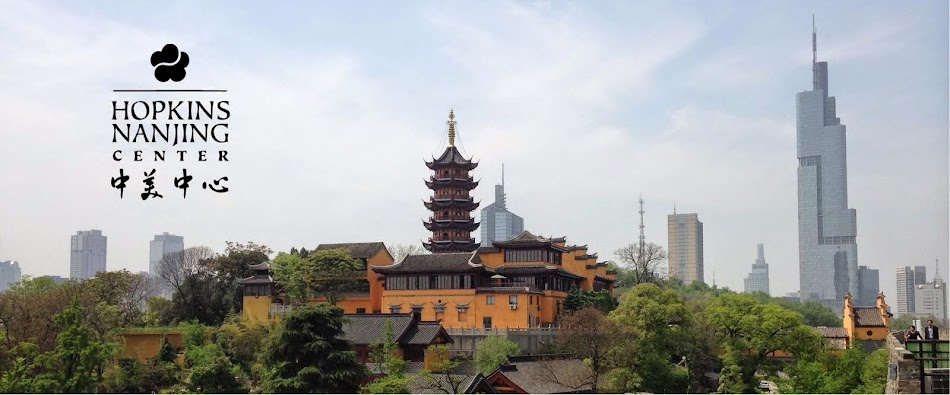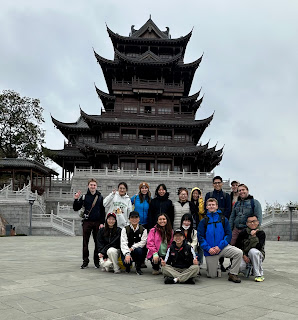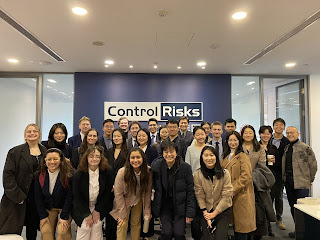A group of American HNC students recently visited the U.S. Consulate General Shanghai for a career trek. They had conversations with foreign service officers and consular fellows about their careers and opportunities at U.S. embassies and consulates. Students gained valuable insights into the day-to-day responsibilities of diplomatic professionals and learned about the diverse pathways available for pursuing a career in international relations.
Deputy Principal Officer
We were first welcomed to the Consulate General with an opening half-hour discussion with the deputy principal officer. He detailed his storied experience of worldwide service as a foreign service officer (FSO). The officer shared with us what skills you will build as an FSO including subject matter expertise, thinking strategically, building a generalist knowledge base, and gaining insights from multiple different rotations. These compound on one another to build a more generalist perspective as you move up in the FSO career. Another importance highlighted was the reality of FSOs being worldwide-available, meaning that the State Department can call any officer to any post due to the needs of the service. Becoming an FSO means that you also are open to learning a new language on top of those you already know. Lastly, he talked about managing family life with his career. Married with a few children, he shared a passion for raising children with a global experience while still being rooted in America.
A Foreign Service Officer and two Consular Fellows
Next, we heard from a panel of three consulate employees –– one political affairs officer and two consular fellows –– two of which are HNC alumni! Political affairs officers interestingly have a role that is not based at a desk; their main job is to be out and about, gathering accounts about everything from politics and economics to culture and social movements. These are written up in reports for Washington’s consumption and decision-making. It’s one thing to have open-source web-based analysis on China, but there is incredible value in having FSOs on the ground in China who are understanding the country from conversations with the Chinese population.
The two consular fellows discussed the process of becoming a fellow and why they chose that route instead of the FSO path. The consular fellow path is only open to four languages, including Mandarin, which is one way to ensure you are able to work in your preferred language at a consulate. The consular fellows program is also a great way to test the waters to see if the FSO lifestyle is for you.
U.S. Commercial Service
It is commonly thought that consulates and embassies only house the Department of State, but these outposts are shared with other government departments and agencies. Part of the Department of Commerce under the International Trade Administration, the U.S. Commercial Service is stationed at the consulate in Shanghai to provide assistance to American businesses exporting goods to China. Trade specialists and foreign commercial service officers assist U.S. businesses in identifying trade opportunities and potential partners within China, as well as provide analysis on international markets and industries. We spoke with the principal commercial officer who shared with us a few insights. In the commercial service, there's less of a focus on language and it is more narrow in scope than the average FSO. He also reminded us to never put the option of being a FSO out of our mind because it can always be a later-in-life career change like it was for him.
Department of Agriculture
We also met with the deputy director of the Agricultural Trade Office (ATO), which promotes U.S. products and trade in China and is part of the U.S. Department of Agriculture (USDA). The ATO offers U.S. export assistance, market analysis, and guidance for many U.S. distributors and wholesalers who are looking to get their products on shelves in China. The ATO also coordinates promotional activities for U.S. businesses in China such as trade shows and food service activities. Working for the ATO is a creative and collaborative opportunity to expand the reach of U.S. products and spur international business in the bilateral relationship.
Public Affairs
Lastly, we spoke with our host, a public engagement officer in the public affairs section. He shared that his section is all about managing relationships with the public, hosting guests, and spreading the messages of the embassy and consulate in China. Their team manages the social media accounts, tries to encourage fair and factual reporting on America in China, and spurs on people-to-people relations with creative projects and events.
A few takeaways
- If you're even thinking about the FSO path, sign up to take the test! It's a free test that you can take once per year and you might have a stronger proclivity towards the FSO career path in the future. Also, it takes many people two or three times to make it through the whole application process, so starting sooner rather than later is best.
- The FSO path is not necessarily a 20 year commitment, but they encourage you to think of it in that regard. It can be a fantastic long-term career and you are eligible for pension after 20 years of service. If you're still not sure you want to do 20 years in the service, don't be afraid to try out another career, because many FSOs become so later in life. To the State Department, the diversity of experience will be valuable.
- All of these roles are fundamentally about promoting the United States, international development, American business interests, and managing bilateral differences and relationships.





































